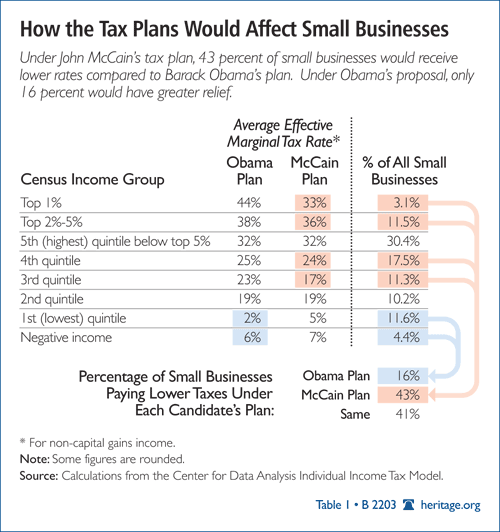Both presidential candidates have spoken of the importance of small business growth to the U.S. economy. However, the two candidates have starkly different visions of the best tax policies for entrepreneurs. The tax burden faced by a small business is a major factor in its ability to succeed and expand.
Senator Barack Obama would make the tax code more progressive by increasing taxes on those at the top and providing credits to those earning and paying the least. Many of the highest earners are small-business owners—who would be hurt by Senator Obama's plan. Senator John McCain would reduce taxes for all small business. Many more businesses would suffer under Senator Obama's plan than is currently understood by the public as well as many Members of Congress.
Two Different Philosophies
Senator Obama says that he wants to help small business, and claims he will cut taxes for small-business owners. But the reality of his proposed tax policy does not match his rhetoric. This became clear when he was recently confronted by a plumber at one of his campaign rallies. The now-famous Joe Wurzelbacher told Senator Obama that he had been saving up to buy the business where he works, and that when he does, he will bring in more than $250,000 a year—thus having to pay higher taxes under the Senator's plan.
Revealing the economic beliefs on which he bases his policy proposals, Senator Obama told "Joe the Plumber" that "it's not that I want to punish your success. When you spread the wealth around, it's good for everybody."
Senator McCain has made clear that he disagrees with this philosophy. He told crowds of supporters that such a policy would force small businesses to cut jobs. His own plan of cutting taxes for everyone, Senator McCain said, "is intended to create jobs and increase the wealth of all Americans."
While Obama claims only to raise taxes on the "rich," the group he is targeting includes many entrepreneurs. The biggest tax hike is placed on those with annual income above $250,000—this group consists of at least 65 percent small-business tax filers.[1] In other words, most of those filers being targeted with the higher rate are small businesses. These small businesses have an average income of about $645,000. These businesses also hire workers, and steeper tax rates could mean lower wages for those workers, no new job openings, and layoffs.
What Does "$250,000" Really Mean?
Critically important to whether a household will be affected by Senator Obama's tax increases is how income is defined. If the tax increase applies to $250,000 or more of gross income, that is quite different than $250,000 of taxable net income. This is especially true for small-business filers, as it would subject revenue, not profit, to tax. It is not $250,000 of gross income that Obama would target, but it is not just taxable income either. Obama would also reintroduce a phase-out of exemptions and deductions for high-income earners (known as PEP and Pease), and these apply to Adjusted Gross Income (AGI).
The $250,000 is a threshold: Filers with incomes above that level are subject to a phase-out of their exemptions and deductions based on their earnings that exceed this level. The threshold for these phase-outs is based on AGI, which is a measurement of a household's income before subtracting exemptions or deductions. The higher this income measure is above the threshold, the more of the household's eligible exemptions and deductions are "phased out." So, some households with less than $250,000 in taxable income would still face an effective tax rate increase: an increase in the taxes paid out of their total income. For a few unlucky filers, the loss of exemptions and deductions could even push them into the top bracket.
An analysis by the Tax Policy Center highlighted the claim that only a small number of small businesses would face higher taxes under the Obama plan.[2] In fact, these tax hikes would affect a significant number of small businesses, particularly those filing as a partnership or S-Corp, a small-limited-liability business. Of those filers reporting positive Schedule C earnings—i.e., the self-employed— only about 6 percent earned more than $250,000 a year. However, of those reporting partnership income, about 33 percent have income above $250,000, and of those reporting S-Corp income, about 40 percent earn above that level. Some Schedule C filers are contractors, not true small businesses, but those filing as partnerships and S-Corps are the types of small businesses that both presidential campaigns have called the backbone of the American economy. More than one-third of this critical group earns enough to be a target of Obama's tax increase.
It is also important to remember that high marginal tax rates hurt those who wish to become successful, and they hurt different individuals each year. Every year, new entrepreneurs fit Senator Obama's "rich" category as they climb the ladder of business success.
There are several problems with a highly progressive tax system. A recent Tax Foundation study of the Obama tax plan described it as an enormous redistribution of wealth that increased the federal budget's dependence on a few wealthy taxpayers.[3] More progressive tax rates have also demonstrated that they lead to lower levels of entrepreneurial activity.[4] Furthermore, higher tax rates for the most affluent have been shown to reduce investment,[5] leading to lower wages for all workers, especially the lower-skilled workers.
When Senator Obama says that only a few businesses will see a tax increase, he is comparing his plan to "current law" under which the Bush tax cuts would expire in 2010. That means that a small percentage of small-business owners are receiving a tax hike even larger than the one set to raise taxes on every income group when the Bush tax cuts expire. Many more small businesses would face a tax increase compared to what they pay today, or what they would pay under McCain's plan.

Obama's Plan: More Progressive, McCain's Plan: More Relief
Obama's tax plan would reduce taxes for those small-business owners earning the least, including those who pay nothing in taxes. This is because so many of his credits are refundable, and, therefore, even those households paying nothing in taxes are eligible for them.[6] The Obama plan would also raise rates on entrepreneurs who are successful. As illustrated in the table, without singling out small business for special tax breaks, McCain's general tax cuts would reduce the marginal effective rates for entrepreneurs much more than Obama's tax plan.
Only 16 percent of small businesses would have lower effective marginal tax rates under the Obama plan, i.e., only small businesses with either negative income or income in the U.S. Census bottom quintile—in other words, those businesses that are failing.
Entrepreneurs who are succeeding would be punished with steeper rates. Businesses that are on their way up, earning net incomes in the U.S. Census third quintile, would face a rate five percentage points higher with Senator Obama's plan than under Senator McCain's proposal. Successful small business owners who fall in the top 1 percent would face an effective marginal tax rate 11 percentage points higher under Obama's plan than under McCain's. Altogether, 43 percent of small businesses would clearly be in a better position under McCain's proposal. Only the bottom 16 percent of unsuccessful small businesses would fare better under Obama's plan. Like Senator Obama's rebates for non-payers, his small-business plan is just a subsidy for failure: It is welfare under another name.
Conclusion
Senator Obama's plan targets tax credits for low-income individuals, and higher tax rates for high-income filers. For small businesses this means subsidizing failure and punishing success.
Obama claims he wants to help small-business entrepreneurs, but his proposed tax policy would punish the most successful entrepreneurs. His plan would also make it more difficult to start a small business. While Senator McCain's plan would provide tax relief to all income groups, Obama's would only reduce the tax burden on the unsuccessful entrepreneur.
The income groups most likely to contribute to the small business economy would be burdened more under Obama's plan. The best way to encourage small business growth is to reduce taxes on all taxpayers, not to shift the burden to the successful. Based on this analysis, McCain's proposed tax plan is better for small business than Obama's proposed tax plan.
Guinevere Nell is Research Programmer in the Center for Data Analysis at The Heritage Foundation.
Appendix
Methodology
The Heritage Foundation's Center for Data Analysis "Individual Income Tax Model" was used to estimate the change in average marginal effective tax rates for individuals filing as a small business under each proposal. A small business is defined as a business that reported income using a Schedule C, or that reported income as a partnership or S-Corporation. The model simulates the effect of tax-law changes on a representative sample of taxpayers. Data for these taxpayers are extrapolated or "aged" to reflect detailed taxpayer characteristics through 2014. The data are aged for consistency with the Congressional Budget Office baseline forecast from the Global Insight model. The implementation of the candidates' tax plans used for the simulation is described in William W. Beach et al, "The Obama and McCain Tax Plans: How Do They Compare?" Heritage Foundation Center for Data Analysis Report No. CDA08-09, October 15, 2008, at http://www.heritage.org/Research/Taxes/cda08-09.cfm.
Quintiles for the 2014 income breakdown are the quintiles of the tax microsimulation model for that year. The income definition used to find the percentiles is one that includes capital gains income, but the quintiles are similar to U.S. Census quintiles. The income definition of the tax filers used to locate them in the quintile break-out is the U.S. Census quintile income definition (which excludes capital gains income). The marginal effective tax rates shown for the filers do not include capital gains taxes; they are marginal effective tax rates for non-capital gains income, which includes salary and wages, dividends, and business income. The tax rate includes payroll taxes and the self-employment tax.



